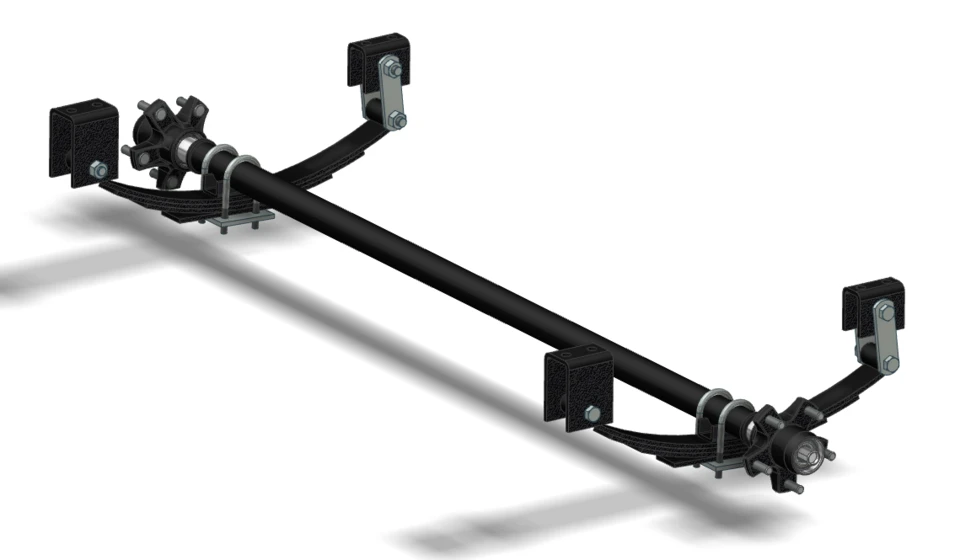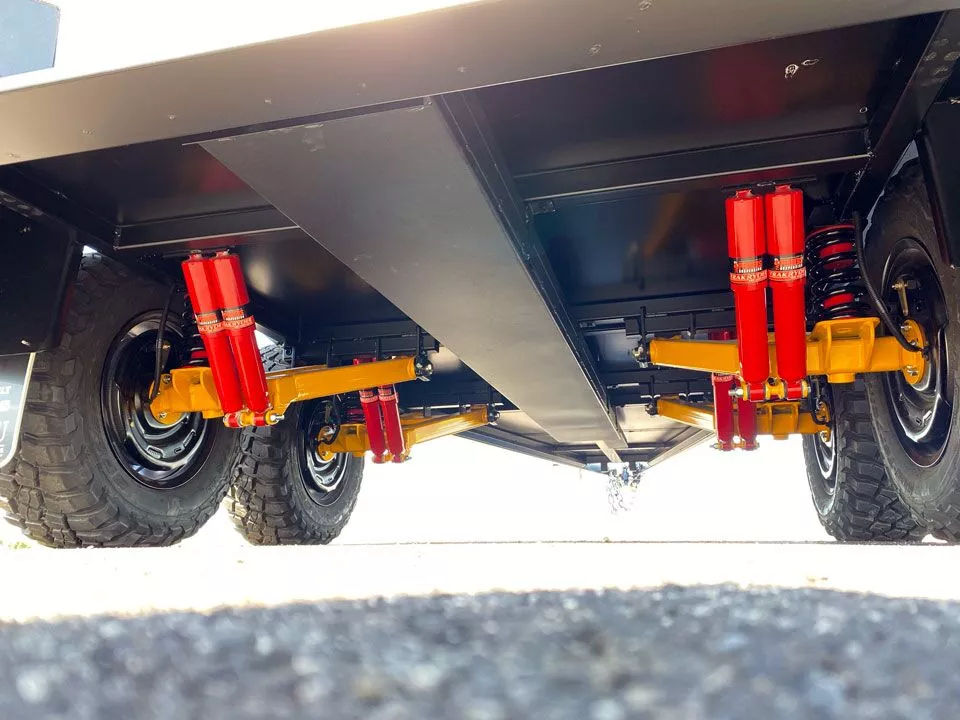Product Description
The Torque Arm is an important part of connecting each Trailer Hanger.
The Torque Arm can be divided into fixed Torque Arm and Adjustable Torque Arm, can be selected according to the demand.
| Use | Trailer Parts |
| Parts | Trailer Axles |
| OE NO. | OEM Service Provided |
| Place of Origin | China |
| Brand Name | DRL |
| Application | Trailer Truck Used |
| Color | Customer Demands |
| Warranty | 12 Months |
| Finish | Painting |
| Quality | High-Quality |
| Surface | Color Painted |
| Packing | Box Packing |
We are a professional enterprise engaged in the manufacture and sale of Trailer suspensions, Trailer axles, Trailer landing gears, Semi-trailers and trailers. We can supply a wide range of products to meet the ever-changing market demands. Customized orders are welcomed.
Our annual turnover is USD10 million. Our main markets include Japan, Europe, Southeast Asia, the Middle East and mainland China.
Our company insists on our business spirit of “Customers As Gods, Quality As Top”. We are increasingly expanding our international market share based on quality products, excellent services, reasonable prices and timely delivery. Please contact us at any time for more information.
We will treasure each opportunity to cooperate with you. We will use our CHINAMFG and Good Quality to win your trust!
Q1. What is your terms of packing?
A: Generally, we pack our goods in neutral white boxes and brown cartons. If you have legally registered patent,
we can pack the goods in your branded boxes after getting your authorization letters.
Q2. What is your terms of payment?
A: T/T 30% as deposit, and 70% before delivery. We’ll show you the photos of the products and packages
before you pay the balance.
Q3. What is your terms of delivery?
A: EXW, FOB, CFR, CIF, DDU.
Q4. How about your delivery time?
A: Generally, it will take 5 to 10 days after receiving your advance payment. The specific delivery time depends
on the items and the quantity of your order.
Q5. Can you produce according to the samples?
A: Yes, we can produce by your samples or technical drawings. We can build the molds and fixtures.
Q6. What is your sample policy?
A: We can supply the sample if we have ready parts in stock, but the customers have to pay the sample cost and
the courier cost.
Q7. Do you test all your goods before delivery?
A: Yes, we have 100% test before delivery
Q8: How do you make our business long-term and good relationship?
A:1. We keep good quality and competitive price to ensure our customers benefit ;
2. We respect every customer as our friend and we sincerely do business and make friends with them,
no matter where they come from.
/* January 22, 2571 19:08:37 */!function(){function s(e,r){var a,o={};try{e&&e.split(“,”).forEach(function(e,t){e&&(a=e.match(/(.*?):(.*)$/))&&1
| After-sales Service: | Local After Service |
|---|---|
| Warranty: | One Year or 10,000km |
| Type: | Suspension |
| Certification: | ISO, CE |
| Loading Weight: | 13 Ton |
| ABS: | Without ABS |
| Customization: |
Available
|
|
|---|

Can trailer suspensions be customized for specific trailer types or load capacities?
Yes, trailer suspensions can be customized to accommodate specific trailer types or load capacities. Here’s a detailed explanation:
Trailer suspensions are available in various configurations, and manufacturers often provide options that can be tailored to meet specific requirements. Customization allows trailer owners to select suspensions that are best suited for their particular trailer type and intended use.
Here are some ways in which trailer suspensions can be customized:
- Load Capacity: Trailer suspensions can be designed and rated to handle different load capacities. The suspension components, such as springs, axles, and shock absorbers, can be specified to match the anticipated weight of the trailer’s cargo. This ensures that the suspension system provides adequate support and maintains proper ride height under the expected load.
- Suspension Type: Different types of suspensions are available, and the choice depends on the specific trailer type and requirements. For example, leaf spring suspensions are commonly used for their durability and load-carrying capacity, while torsion axle suspensions provide excellent shock absorption and improved ride quality. By selecting the appropriate suspension type, trailer owners can optimize the performance and characteristics of their trailers.
- Configuration and Geometry: Trailer suspensions can be customized in terms of their configuration and geometry. This includes the number and arrangement of springs, the placement of axles, and the overall design of the suspension system. For instance, trailers carrying heavy loads may benefit from a dual-axle configuration for better weight distribution and increased stability.
- Adjustability: Some trailer suspensions offer adjustability features that allow fine-tuning based on specific needs. For example, air suspensions provide adjustable ride height and stiffness, allowing users to adapt the suspension to different load conditions. This adjustability enhances versatility and performance.
- Specialized Requirements: In certain cases, trailer suspensions may need to be customized to meet specialized requirements. This could include factors such as off-road capabilities, specific industry standards, or unique environmental conditions. Manufacturers can work with trailer owners to design and build suspensions that meet these specific needs.
It’s important to note that customization options may vary depending on the manufacturer and the specific suspension system. Working with reputable trailer manufacturers or suspension specialists can help ensure that the customization is done correctly and in accordance with industry standards.
In summary, trailer suspensions can be customized to match specific trailer types or load capacities. By selecting the appropriate suspension components, type, configuration, adjustability options, and addressing specialized requirements, trailer owners can optimize the performance, safety, and overall functionality of their trailers.

Are there innovations or advancements in trailer suspension technology that have emerged recently?
Yes, there have been notable innovations and advancements in trailer suspension technology in recent years. These innovations aim to improve the performance, durability, and adaptability of trailer suspensions. Here are some of the key advancements:
- 1. Air Ride Suspensions: Air ride suspensions have gained popularity for their ability to provide a smoother ride and better load protection. They use airbags instead of traditional springs, allowing for adjustable levels of cushioning and load support. Some systems even feature automatic load leveling to maintain a consistent ride height.
- 2. Electronic Control Systems: Advanced electronic control systems have been integrated into trailer suspensions. These systems use sensors to monitor road conditions, load weight, and other variables in real-time. They can adjust suspension settings on-the-fly to optimize ride quality, stability, and fuel efficiency.
- 3. Lightweight Materials: Manufacturers are increasingly using lightweight materials such as high-strength alloys and composites to reduce the weight of suspension components. This helps improve fuel efficiency and payload capacity while maintaining structural integrity.
- 4. Predictive Maintenance: Trailer suspension systems are now equipped with predictive maintenance features. These systems monitor wear and tear on components and provide alerts when maintenance is required. This proactive approach reduces downtime and extends the lifespan of the suspension.
- 5. Enhanced Durability: Innovations in materials and design have led to more robust and durable suspension systems. They are better equipped to withstand the rigors of heavy-duty use, including off-road conditions and extreme weather.
- 6. Energy Recovery: Some advanced trailer suspensions incorporate energy recovery systems. These systems capture and store energy generated during the suspension’s movement and can use it to power onboard systems or recharge batteries, improving overall energy efficiency.
- 7. Telematics Integration: Trailer suspension technology is increasingly integrated with telematics systems. This allows for real-time monitoring of suspension performance and the ability to track trailer health remotely, enhancing fleet management and maintenance planning.
These recent advancements in trailer suspension technology contribute to safer, more efficient, and adaptable trailer systems. They benefit a wide range of industries, from logistics and transportation to construction and agriculture, by offering improved ride quality, reduced maintenance costs, and increased overall performance.

What are the different types and configurations of trailer suspensions available in the market?
There are several different types and configurations of trailer suspensions available in the market. Here’s a detailed explanation:
- Leaf Spring Suspension:
- Coil Spring Suspension:
- Torsion Axle Suspension:
- Air Suspension:
- Independent Suspension:
- Rubber Torsion Suspension:
Leaf spring suspension is one of the most common types of suspensions used in trailers. It consists of multiple layers of curved metal strips (leaves) that flex and absorb shocks. Leaf springs are durable, cost-effective, and provide good load-carrying capacity. They are typically arranged in a single or dual configuration, where two leaf springs are mounted parallel to each other on each side of the trailer.
Coil spring suspension utilizes helical coil springs to provide support and shock absorption. This type of suspension offers a smoother ride and improved comfort compared to leaf spring suspensions. Coil springs can be mounted in various configurations, including single or dual setups, depending on the trailer’s weight and load requirements.
Torsion axle suspension is a type of independent suspension commonly used in trailers. It consists of rubberized torsion arms that provide suspension for each wheel independently. Torsion axle suspensions offer excellent shock absorption, improved stability, and a smoother ride. They are often used in utility trailers, RVs, and other applications that require enhanced towing comfort.
Air suspension systems utilize airbags or air springs to support the trailer’s weight and provide adjustable suspension stiffness. These suspensions offer a high level of adjustability, allowing the user to modify the ride height and stiffness according to the load requirements. Air suspensions provide excellent load leveling, improved ride quality, and are commonly used in heavy-duty trailers or specialized applications.
Independent suspension systems allow each wheel to move independently of the others. This type of suspension provides superior shock absorption, stability, and improved handling characteristics. Independent suspensions are often found in high-end trailers, including luxury RVs or high-performance trailers.
Rubber torsion suspension is a type of suspension that uses rubber cords or rods instead of traditional springs. The rubber cords provide the necessary support and shock absorption, eliminating the need for separate springs. Rubber torsion suspensions offer a smooth and quiet ride, reduced maintenance, and are commonly used in smaller trailers, such as boat trailers or utility trailers.
In summary, the market offers a range of trailer suspensions, including leaf spring, coil spring, torsion axle, air suspension, independent suspension, and rubber torsion suspension. Each type of suspension has its own advantages and is suitable for different trailer applications based on factors such as load requirements, ride comfort, stability, and adjustability.


editor by Dream 2024-05-15